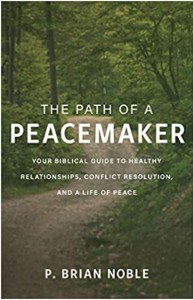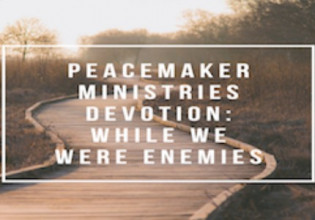Teaser:
Man #1: I’ve been hurt enough already I don’t want to think about it anymore. Just don’t bring it up.
Woman: I can believe she said that! I’ll never speak to her again.
Man #2: Oh right! Like I’m supposed to forgive or something. I don’t think so. It’s payback time.
End of Teaser
John Fuller: Mmm, well, those are some fairly common ways that we tend to react in conflict, with anger, or perhaps a desire for revenge, or maybe trying to avoid it all together. Today, on Focus on the Family we’ll be discussing conflict and, uh, some ways that we respond. And maybe a better way, a more godly approach, uh, that we might call peacemaking. I’m John Fuller, and your host is Focus on the Family president, Jim Daly.
Jim Daly: John, in this life conflict is inevitable, even for Christians. Even though we may know better, it’s hard to fight that fleshly response. And, uh, we know that’s true by experience, but somehow, I think we wish or pretend that conflict simply wouldn’t exist, that’d be nice. Uh, we don’t like to talk about it. Conflict feels like something dirty that we’d rather not deal with-
John: Mm-hmm.
Jim: … right? Of course, none of those responses are helpful or healthy. Attacking the person who attacks you doesn’t really solve anything. Um, nor does running away from the disagreement you may have. It’s finding that balance.
John: Mm-hmm.
Jim: Here at Focus on the Family, we have a different approach. We try, every day at least, we have something called healthy conflict. We don’t always hit the mark, but we try. And that is where we deal with contentious issues in a respectful, caring way before they get out of control. And I’ve always believed that we gotta put our problems up on the table. The enemy of our soul works mischief when it’s kept in the dark.
John: Mm-hmm.
Jim: But when you can talk things through in the light, uh, that’s typically where the Lord can bring resolution, help and healing. So I’m looking forward to today’s program.
John: I am too. And it’s, it sounds like it should be easy to manage conflict, but a lot of us just don’t have the tools. I mean, our family patterns were such that, you know, there were eruptions. That was kind of common for my family, we erupted and then we just moved on. And nothing ever happened.
Jim: (laughs)
John: And-
Jim: No correction.
John: Well, so I… Yeah. So I’ve tried to pass on a better legacy to my kids, but I think I failed. I mean, we had a couple girls fighting just the other day (laughs).
Jim: Well, that-
John: It was exhausting.
Jim: … that’s kind of, uh, normal stuff, right?
John: Um, so yeah, wounds can run deep and they can last for generations.
Jim: That’s true. Well, I love Proverbs 27:17, where iron sharpens iron.
John: Mm-hmm.
Jim: And that’s what we wanna achieve today.
John: Yeah.
Jim: We want to, uh, challenge you, sharpen you with our guest, pastor Brian Noble. He’s executive director of Peacemaker Ministries. He’s also the executive pastor at Valley Assembly of God Church, in Spokane, Washington. One of my favorite places, by the way. It’s a beautiful area.
John: It is lovely.
Jim: And, uh, he’s also a certified Christian conciliator. And, uh, Brian, that’s hard to say, by the way.
Brian Noble: That is hard to say (laughs).
Jim: But, welcome to Focus on the Family.
Brian: Thank you so much.
John: And pastor Noble has written a number of books. The one that, uh, we’re gonna be talking about today is called The Path of the Peacemaker: Your Biblical Guide to Healthy Relationships, Conflict Resolution, and a Life of Peace. And you can get your copy at focusonthefamily.com/broadcast.
Jim: Brian, uh, explain why you believe conflict, or tension as you call it, can be a force for good, or bad, in our lives? I like this concept. I think even negative things can be used for good. Of course, Romans, the book of Romans says, “All things work for good.” Uh, including conflict, really?
Brian: Yeah, so we, at Peacemakers, like to say we have healthy tension, and unhealthy tension, right. Healthy conflict, and unhealthy conflict. And the key to it is that healthy tension brings us closer together. Think about this, illustrations of the Old Testament where God used tension or conflict to bring people back to Him, back to His heart, back to who He is. And so, we like to say that, uh, that healthy tension creates better outcomes. And so, what we see in the church, oftentimes, and in families, is where silence rules and there isn’t a great outcome. You know, there isn’t a great, um… There are just patterns of bad behavior or patterns of, of broken relationships. And so that healthy tension brings us closer together, or can bring us closer together [crosstalk].
Jim: Yeah, can. That’s key.
Brian: (laughs)
Jim: You know, one of the, uh, verses you point to is Romans 12:18. Uh, this may be a God incidence, but Jean and I are reading through the book of Romans, and just today we were reading Romans 12 and read that very verse. Why is Romans 12:18 such a good verse for us when it comes to this issue of, uh, peacemaking?
Brian: Well, I think it’s important when you look at the, the context of that scripture, he’s talking about our love and what we go through. And then it says, “If possible, as far as it depends upon me, live at peace with all men.” The reality is it’s not always possible, right?
Jim: He does go to, uh, extremes there to explain that maybe it won’t happen all the time.
John: Yeah.
Brian: Yeah, and I think-
Jim: (laughs)
Brian: … Christians struggle with that. And we get calls all the time where people begin to think, if I call Peacemaker Ministries, they have a secret sauce, they pour it over, whatever, and it just fixes everything. The reality is that we’re, we’re humans. And we’re fallen humans. And so, sometimes it takes a period of time to see that transformation of heart. And so, he says, “If possible, as far as it depends upon you,” so he does place the responsibility back on the individual, “live at peace with all men.” And the reality is whether… You know, Jim, whether you respond in a negative way, or I respond in a negative way, I can still be at peace with you because I understand the gospel message.
Jim: Yeah. No, it’s good. Y- you know, something that we say within the Christian community often is, “In essentials unity, in non-essentials liberty, and in all things charity.” But why do we reverse that? It seems like we reverse that and end up fighting over small things that really don’t matter, and we don’t hold each other accountable to the things that really do matter.
Brian: Right. I think since the fall we’ve had a tendency to wanna play God in things. And so, James-
Jim: Yeah.
Brian: … chapter 4 says, “What is the source of quarrels and conflicts among you? Is it not your desires that are a battle within you?” And so that internal battle that we have is what causes us to take the minor things, those things that are just elements or preferences that we have, and elevate them to such a degree that we’re willing to break relationship with them.
Jim: Yeah.
Brian: And so, you think about that. Like, uh, when I was first married I can remember sitting on the couch with my wife and we’d just had a great dinner, and she says something like, “Hey,” uh, “are you gonna go do the dishes?” And I’m like, “No, women do the dishes.” Ouch! And she said, “Excuse me.” And then I-
Jim: Yeah. No, [inaudible].
Brian: … wasn’t very smart, I repeated myself, right. I said-
Jim: (laughs)
Brian: … “Women do the dishes.”
John: Maybe you didn’t hear me right.
Brian: Right, exactly. And so, I, I like to tell that story. It wasn’t that I was a, a male chauvinist. In that moment, I had the example of growing up that my mom did the dishes, right. And so, I had equated my mom’s way of running the household to the normal pattern. And so that desire was in me that way. And so, just so we’re clear, I do the dishes and cook now, so (laughs).
Jim: (laughs). Well, no, it… But it raises an interesting point, and that is expectations.
John: Mm-hmm.
Brian: Right.
Jim: So, so much of disagreement in human relationship comes from unmet expectations that we have on each other. Often in marriage-
Brian: Yeah.
Jim: … it’s just not even expressed, like that.
Brian: Exactly.
Jim: Well, don’t you do this, and I do this? And it’s not mean-spirited.
Brian: No.
Jim: But it could be taken in such a way that, man, it creates big conflict.
Brian: It can. And, and oftentimes when I’m talking to someone I’ll ask them, have you communicated that expectation? And I don’t know the real percentage, but I thi- I would say probably 90%, no, I haven’t. They should just know that.
Jim: Right.
John: Ooh.
Brian: And it’s like, I don’t know that that’s true. Do we really… I mean, can we really read someone else’s mind? Or-
Jim: Well, let me ask all the wives listening right now.
Brian: Right.
Jim: Does that work with your husband? I don’t think so. I mean, we’re terrible at reading our wives’ minds, right.
Brian: Right, exactly.
Jim: Generally.
Brian: Generally, yeah.
Jim: I’m sure there’s one that’s gonna send us a note saying. “No, I do. I do it well.” Good-
Brian: Yeah.
Jim: … for you. Maybe you should write a book.
Brian: (laughs)
Jim: Um, you’ve developed a four-step process. And this is really good, maybe with your permission we’ll put these four steps at-
Brian: Absolutely.
Jim: … the website.
Brian: Mm-hmm.
Jim: But, um… And this is four step process for peacemaking, uh, what you call the path of the peacemaker. Walk us through those four steps.
Brian: So, we, we understand that if we’re gonna handle conflict, uh, from a biblical approach, we need to come to our senses. Like, in the prodigal son, he found himself in the pig pen and he, he came to his senses. So, we say, discover the story. What are the facts of the story versus the emotional memories of the story, right? Because oftentimes those emotional memories will speak so much louder than what actually was said or took place.
Jim: Now, I wanna punch this a little bit because that sounds like one of the most difficult things to do, as human beings, is to really get to objective truth. What’s really happening here?
Brian: Yeah-
Jim: It’s hard for us to-
Brian: It-
Jim: … that.
Brian: It is. And so, we tell people, write out the story. If they’re in a repeated conflict, write it out, underline the facts, and highlight the emotional memories.
Jim: Oh, interesting.
Brian: And then we say, I double dog dare you to take that to a neutral person and see if they underline and highlight the same areas.
Jim: Oh, wow.
Brian: Because it’s easy to convince ourselves that the emotional memory will always speak louder. It’s that internal desire I was talking about, wrestling inside of us-
Jim: Right.
Brian: … speaking louder than the other parts.
Jim: So that’s step one.
Brian: That’s step one.
Jim: Which is, what’s real.
Brian: And then we ascend. We go back to our biblical core values. Like the prodigal son, he says, “I’m gonna go back to my father.” So we go back to our biblical core values. We put aside the conflict and we seek the things above. And so, yesterday I was working with a gentleman back east… I’ll just say that. And he told me his story for about an hour. And I said, “Let’s stop and pray.” And I said, “Can I remind you that God is with you-
John: Mm-hmm.
Brian: … that his character is a good God?” And so, we prayed together. And it’s amazing when you get that filter of God’s presence, and God’s character is good, and that we’re children of God, uh, into the situation. It helps filter us. It helps change our perspective.
Jim: And number three.
Brian: We reflect. We take personal responsibility. Matthew 7 says, “Take the log out of your own eye,” just, “so you’ll see clearly to take the speck out of your brother’s eye.” And-
Jim: That’s a tough one.
Brian: It is a tough one.
Jim: (laughs)
Brian: And, and this is where we need help, oftentimes. We need a coach to come b- beside us. And the reality is a lot of key leaders, uh, and, and fathers, and families, they don’t have someone who’s truly honest with them to help them see the speck, or the log in their own eye.
Jim: Mm-hmm. Yeah, I kinda consider that spiritual dyslexia.
Brian: Right.
Jim: We always… We tend to act out like, I’ll get the speck out of my eye, so I get the log out of your eye.
Brian: Exactly.
Jim: (laughs)
Brian: Exactly.
Jim: And that’s not what the Lord is saying. And, and number four.
Brian: Is connect. We, we believe in asking for forgiveness, and making a plan, and implementing that plan, that’s really key. The prodigal son said, “I’m gonna go back to my father.” And in the next verse it says, “And he went.” Right? So a lot of Christians say, I’m gonna go do this, but they never go.
Jim: Mm-hmm.
Brian: And so, that’s where we need to be people where we make a plan and we go back and apologize. If you wanna be the man of th- of your house, be the first one to the cross.
Jim: Mm-hmm.
Brian: Be the first one to repent. That’s manliness.
Jim: Brian, I… This is a tender area, but your childhood was tough. And people aren’t gonna pick that up because of your joyfulness now, and your commitment to Christ, and the fact that you’re doing peacemaking. But you had a really hard, uh, family life. And your parents divorced. Tell us how that experience impacted you.
Brian: Yeah. So I… Uh, my parents were divorced when I was like, six years old. And this would have been in the ’70s, uh, when divorce wasn’t nearly as common. I was raised in a small town, in Central Washington. And, as far as I can remember, I was the only kid who had gone through divorce in our whole school. And, uh, by the age of 12 I started, uh, having an alcohol problem.
Jim: At the age of 12?
Brian: Yeah. So alcohol was in our home.
Jim: Wow.
Brian: So I was able to steal it from my parents or-
Jim: Yeah.
Brian: … what, what have you. And, uh… It was, I would say, sporadic at times, you know, it was not as consistent. But by the age of 18, when I moved to Spokane, uh, it was every day.
Jim: What were you trying to medicate-
John: Mm-hmm.
Jim: … for?
Brian: I think there was a lot of things. Um, you know, just going through a divorce I think my, my dad, uh… I love him and we’ve had… It’s always hard to talk about ’cause we’re completely reconciled now. Uh, but, uh, just my dad wa- It was just a struggle for him.
Jim: Yeah.
Brian: Uh, he was a pastor. And so, the divorce caused him not to, to be a pastor any longer. And there was just a lot of bitterness that was there. And so, I was, uh, working on that. Um, I think I was also just simply working on, you know, the, the fact of, you know, which parent do I live with? That was back when they did a lot of joint custody, this week, that week, you know. And rules, uh, changing all the time.
Jim: Yeah.
Brian: And so… And part of it was just naiveness and stupidness, quite frankly. But-
Jim: Yeah.
Brian: … there, there was a lot of that going on.
Jim: Well, and that’s so hard. And that feeling of, um… You know, I don’t know. Uh, inability or the lack of confidence can come from that. I know that because I lived something similar.
Brian: Right.
Jim: My parents divorced about that same… When I was that same age.
Brian: Yeah.
Jim: I didn’t find alcohol in the house.
Brian: Right.
Jim: But, man, it was just a… It’s a crushing blow.
Brian: Right, it is. And it’s just one of those things that, um, I, I think if, if people looked at their life and said, do I wanna plan for this? Obviously not. But that whole verse in Romans, where it says, “He turns it around for God’s good.” And so that’s what gives me the burden and desire to help in peacemaking, is to say, how can we save families? How can we save churches from going through destructive conflict?
Jim: And just to be clear, at about 18 you cried out to God and…
Brian: I did. Actually, uh… God used an unbeliever. I, I was actually contemplating suicide. I was thinking I was done with life. And an unbeliever just, uh, a friend of mine from college came over, knocked on the door and said, “What are you doing?” Uh, I had, had my gun out. I was ready. And he took the gun. And I said, “God, if you’re real, you have to show yourself to me.” And, uh…
Jim: Hmm.
Brian: And just through a number of events God revealed himself to me.
Jim: Huh.
Brian: And I went to a church in Spokane, and they s- they knew my grandfather, who was a pastor. And they’re like, hey… They thought I was a Christian kid that moved to Spokane. You wanna teach Sunday school? And I’m like, uh, sure. I di- I didn’t know what to do. And then they realized, he doesn’t know anything, you know (laughs). And so, they backed up the wagon and, and, uh, said, wait, wait, wait. We gotta… We gotta do some discipleship here. And, uh, Mark [inaudible], uh, a good friend of mine, asked me, “Do you wa- Do you know Jesus Christ as your Lor- Have you repented?” I’m like, “No.” And so, we repented of our sin, was baptized, and just began to move in the things of God, and, and went through Bible school, and that kind of thing.
John: Mm-hmm, wow. What a remarkable story from Brian Noble, today, on Focus on the Family. And, um, we want to encourage you to call us if you have any questions about what he was just talking about, knowing who Jesus Christ is and knowing His forgiveness. Um, we’d be happy to tell you more. And then, uh, certainly, we’d love to have you pick up a copy of The Path of a Peacemaker: Your Biblical Guide to Healthy Relationships, Conflict Resolution, and a Life of Peace. Uh, reach out if we can help. Our number is 800, the letter A, and the word FAMILY or we’re at focusonthefamily.com/broadcast.
Jim: Brian, uh, in the book you reviewed the life of Jesus and how he dealt with conflict. That’s always a great source of direction for us, right.
Brian: Yeah, exactly.
Jim: How did Jesus deal with this?
John: Mm-hmm.
Jim: Uh, he responded to it in, in kind of unexpected ways. And we can learn from that example, that’s your claim in the book. Let’s start with the story about the woman caught in adultery, in John chapter 8. Uh, what can we learn from that experience?
Brian: I think, oftentimes, when we look at conflict, Jesus knelt down and paused, and let people do what they need to do. I find a lot of times in fathers, and in leaders, you’d stand up and fight, right.
Jim: Mm-hmm.
Brian: So to kneel down and pause. And then when he addressed the woman who was caught in sin, he asked a question. Most of us, when we’re… When we’re in conflict, we just make statements.
Jim: Mm-hmm.
Brian: And I’ve learned to step back and say, let’s ask a question… Now, here’s the thing, the more intimate the relationship, the more difficult it is to pause. So I c- I could work this out with you, uh, between us, really quick. When I go… When I go home it can be a lot more difficult ’cause the relationship’s much more intimate. And so, having that go from area to area, and making an authentic response, takes time and practice.
Jim: Yeah. And it’s a good example. Yeah, he was writing in the ground and said, “He who is,” uh, “without sin, let him cast the first stone.”
Brian: Right.
Jim: To the crowd.
John: Yeah.
Jim: And they all walked away, the oldest to the youngest.
Brian: Yeah.
Jim: In that order-
Brian: Yeah, exactly.
Jim: … which I find interesting.
John: Yeah. I’m thinking there’s a couple of different conflicts going on there, right. I mean, there’s the woman who is in conflict, obviously, with the men who brought her to Jesus, but they were really trying to set Jesus up. So there was a conflict between Jesus and the, and the leaders, as well.
Brian: Absolutely. And you think about that tension and how the creator of the universe handled that so well. I mean, I… Uh, it’s surprising, but it’s not, at the same time, right. I mean, He’s the creator. And so, when we, we think about how he, He took all those dynamics and He interwove them into a place where, man, this is how he responded.
Jim: Mm-hmm, yeah.
Brian: I think we can learn from that.
Jim: Another one that is often used, I mean, I can’t count the number of conversations I’ve been in when we’re talking about the political arena-
Brian: Mm-hmm.
Jim: … or some other major conflict. And people go, Christians go, right to Jesus overturning the money changer’s table, right.
Brian: Right, exactly.
Jim: ‘Cause we love that righteous anger.
Brian: Exactly. Yeah.
Jim: And see, even Jesus got mad at these people. And he upset the money changer’s table and cleared the deck, so to speak. Um, what was going on in there? What do we really need to understand about what Jesus was accomplishing in that moment?
Brian: Yeah. I think it’s important to realize that when we’re looking at righ- uh, righteous anger from Jesus, and our righteous anger, there might be a slight difference, right.
Jim: (laughs)
Brian: Fir- First and foremost because, uh-
Jim: One is righteous, and one is not.
Brian: Not. Exactly (laughs). And I also think that the things that Jesus fought for, th- that his hou- that God’s house would be a house of prayer, and my political preference, might be two different things. And so, oftentimes, we take the standpoint from two different angles, right. And it’s like we’re saying, well mine’s righteous because of this. Well, uh, you know, is it really about God’s kingdom or about your kingdom? I think that’s a big, important question.
Jim: Mm-hmm.
Brian: Uh, you know, you think about i- is this a, a, a sin that you can find in the Bible? Or is this a personal preference that we have? And I think… And, and, you know… And then, also to realize that Jesus never set aside the fruits of the Spirit.
Jim: That’s good. I like that.
Brian: You know what I mean. Like, he didn’t like, uh, in that moment say, well-
John: He didn’t temporarily lose it there.
Brian: Yeah, he didn’t lose it there. He’s like, uh, he… Everything he did, he did intentionally.
John: Mm-hmm.
Brian: And I can tell you in my anger, everything I do is not intentional.
John: Oh, yeah.
Jim: I- I- I- This is a great point. And, you know, it’s funny I, I know a Christian leader, one time we talked about this person’s lack of patience. And he said, you know, “I just, out of the fruit of the Spirit, I just don’t have a lot of patience.” I remember the thought that went through my mind is, I don’t think it’s a, like a menu you order from.
Brian: (laughs)
Jim: I mean, yeah, give me four ounces of-
John: Yeah.
Jim: … patience, six ounces of love.
Brian: Right.
Jim: It’s like it’s present, or should be present, in the believer’s life because you’re tapping into the very nature and character of God.
Brian: Mm-hmm.
Jim: That’s what the promise is.
Brian: Yeah.
John: Yeah. Brian, you mentioned something and, and I’d like to ask about that. W- Why is it… I mean, I, I thought of Paul in, in, um, Romans 7, when he says, “The very things I don’t want to do I do.” When I get upset and I’m in an argument, or I have a conflict, I really blow past everything I would like to see happen. Why is that?
Brian: Well, I think it’s because of that… It’s sanctification. If we… If we boil it down to one word, right. We’re being sanctified. We’re being… That process of being made holy in God’s presence. So we are brand new creations, uh, at the same time there’s parts of us that are being turned over, and over, and over. ‘Cause we won’t be fully like him until his presence.
John: Mm-hmm.
Brian: Um, Romans chapter 7 is also one of the most misquoted areas. Because you have to read the bookends, Romans 6 and Romans 8.
John: Yeah.
Brian: And those bookends are important to the context. I, I, I’ve heard many leaders and, and fathers make excuses, and say, well, I, I do the things I don’t wanna do, and so I just did those things, you know. That’s not Paul’s intent in writing those things, you know.
John: Right.
Brian: Uh, he says, “Shall we go on sinning so that sin,” uh, “grace may increase? By no means!” You know. And, uh, the idea that we can truly, uh, have self-control. The other thing is, I think we look at perfection versus practicing.
John: Mm-hmm.
Brian: We are being made perfect in the sight of God, but we forget to practice. Um, and so self-control is developed by a daily walk, a daily practice. If you just wait till you’re in the fight, or you’re in the, you know, in the, in the game, and say, well, now I’m gonna practice. That doesn’t work in football, doesn’t work in basketball, doesn’t work in anything. You practice before the event. And I think oftentimes, we forget to practice self-control before the event.
John: Mm-hmm.
Jim: Yeah, that’s good. And, and go through the mental picture of it.
Brian: Exactly.
Jim: That’s what you’re saying.
Brian: Yeah.
John: Mm-hmm.
Jim: Hey, Brian, a key theme from your book The Path of a Peacemaker is, uh, keeping our eyes on the main thing.
John: Mm-hmm.
Brian: Mm-hmm.
Jim: So everybody’s gonna say, well, what… Okay, what’s the main thing? Do you have an example of the main thing?
Brian: I think it’s the gospel. Um, I, I like to ask people when, when we talk about picking up our cross daily and dying, how are you dying in this conflict? How are you setting your preferences aside to allow God’s newness of life to walk through you? It seems like we have a lot of theology, uh, when it comes to, uh, salvation. But for some reason, when it comes to conflict, we forget that same theology.
Jim: Mm-hmm.
Brian: And so, the main thing is the gospel message. And then I think it’s both sides of the gospel. So it’s not just what we don’t do, but it’s where we begin to proclaim what God has already done. We’re new creations in Christ Jesus. And this is where, Jim, if we’re in conflict, where I sometimes can think about your old bad behavior, or my old bad behavior, and forget to say, wait, that is a child of God sitting across from me. That- He is a brand-new creation.
Brian: Um, I had a conflict with a lady at church the other day. And it frustrated me. And I went down, I, uh, actually sat in our hot tub, and I was like, “Lord,” um, “what’s going on?” He said, tell me the story, right. And then, what’s biblical values? And I said, “Oh, my core value is, she’s a child of God. That’s my sister.” And my whole perspective changed.
Jim: Mm-hmm.
Brian: Because I reminded myself that, that this is part of my family, not just someone who’s annoying me in the moment.
Jim: (laughs)
Brian: And so (laughs)…
Jim: That’s true.
Brian: And so, I called her back. I said, I was ungracious in that response, can we have coffee and talk? And so, her husband and… We all got together, and we just talked. And it was a, a great event to, to agree to pray about some things and-
Jim: Here’s another tough one, Brian, and that is the overlooking of an offense.
John: Mm-hmm.
Jim: And I… Right when I said that, I’m sure many listeners just went, yeah, but you didn’t know what that person did to me.
Brian: Right.
Jim: You can’t overlook that. Why is it so hard for us to overlook an offense? And why is it so important for us to do so?
Brian: Right. So Proverbs 19:11 tells us that, that we’re… “… it’s to a person’s glory to overlook a transgression.” And so the idea of overlooking is not sweeping it under the rug. It’s going to the cross… I believe it’s through prayer. And saying, Lord, I lay this at your feet, and say that, God you are the judge of this event.
Jim: Mm-hmm.
Brian: I think it’s intentional, uh, versus, uh, passive. And so then, why is it critical? Because God has looked so much in us through Jesus Christ, right. He’s laid it at the cross for us. And it’s difficult because we want justice now.
Jim: Mm-hmm.
Brian: Um, we want to be right now. And I like to tell people, when you put this conflict in the scene of eternity, and you trust God to be the ultimate judge… That’s the last part of, of verse 12, uh, chapter 12 of Romans. You understand that he’s a much better judge than you are, or I am. And-
Jim: Thank you, Lord.
Brian: Yeah. He’s fair, right.
Jim: (laughs) no kidding.
Brian: And we have a tendency to think, well because of God’s grace he’s going to wink at sin or something. And it’s not true.
Jim: No.
Brian: He’s a righteous God.
Jim: Mm-hmm, yeah.
Brian: And, and He wants justice. And so trust in Him.
Jim: Brian, as we come in for the landing, I, I love… There was a story that, you know, really made an impact on me and I wanna close with that story, about responding to conflict with humility. This is a female teacher, um, and this was you. How did you manage that? What was the scene? What did she do to pro- provoke the situation? How did you manage it?
Brian: Yeah. So we entered into a public high school. Um, and, um, there had been two teenage suicides and they had contracted with us to help figure out what the tension or conflict was. And so we had, uh, my partner and I, we had done a lot of intake, conversations, and discovery. And, uh, we were giving a report back to the, uh, teaching staff. And one of the ladies there didn’t like the report, is in essence what happened. I was talking about consistency of classrooms, like, having a consistent set of rules throughout the classrooms ’cause the students were being frustrated with different rules in each classroom. And she stormed out. It was obvious-
Jim: Mm-hmm.
Brian: … that she didn’t like that, uh, that, those points.
Jim: And she said something, right.
Brian: She slammed the door. I mean, in front of hundreds of people, she stormed out and slammed the door. And so, I went to another teacher who I knew was a believer, and I said, “Hey, we need to go, we need to go talk to her.” And he said, “No way.”
Jim: (laughs)
Brian: And he’s like this tall guy. And I’m like, “All right, let’s go.”
Jim: (laughs)
Brian: And so, uh, A, I didn’t wanna address her alone, obviously for-
Jim: Yeah.
Brian: … those kind of reasons. So we went in there and it was like a tornado had gone off. And she was throwing things, just a big temper tantrum. And so I don’t know why, I believe it was just the Holy Spirit. I just got down on my knees by a table, put my arms up on the table, and, and said, “Tell me more.” You know. And, so she’s like, “All these men in my life try to te-” You know, and so she was… Went through this rant with me. And I… And I just listened. And I said, “Will you forgive me?” And it got really quiet. And she started bawling. She said, “You’re the first man that’s ever asked me to forgive.”
Brian: She started walking towards me and I said, “I want your forgiveness because obviously I hit a hot button on you, and that wasn’t my intention. I want to respect you. I care for you. And I want you… You seem like you’re a great teacher.” And she kept coming towards [inaudible]. And she was this very short lady, and she says, “Brian, can I hug you?” And I’m looking at the other teacher like, is this appropriate?
Jim: Mm-hmm.
Brian: So I try to do the Christian side hug. And she’s just sobbing. And she told me, she said, “I just have never had a man,” uh, “do that. I’ve had an abusive husband.” And she went through this whole little thing.
John: Mm-hmm.
Jim: Yeah. I mean, that’s tough stuff.
Brian: And I said… We talked through it. And then she says, “Well, I know that you weren’t intentionally trying to single me out.” ‘Cause I, I had never addressed her publicly. But it just felt that way. And I said, “Will you forgive me for that?”
Jim: Well, and… Brian, in your experience, uh, helping people like that, how often are these root things-
Brian: Mm-hmm.
Jim: … years old, and people are pushing a button that has been formed-
Brian: Yeah.
Jim: … in, uh, some other circumstance? I mean, it’s like 100%.
Brian: Yeah, it is. It’s, it’s a huge percentage. And, and oftentimes the, the individual themselves, don’t even know until that moment.
Jim: Right.
Brian: ‘Cause it’s like a landmine. It’s just sitting there.
Jim: These are triggers.
Brian: Mm-hmm.
Jim: Well, Brian, this has been so good. And I hope the folks are encouraged and hopefully, a little more challenged about how to forgive, and how to take things to the cross, and how to lay it down, and ask for forgiveness. Don’t sweep it under the rug, but to get right in there, with humility-
Brian: Right.
Jim: … which is the key-
Brian: Right.
Jim: … to really find, uh, success in your relationships. And, uh, this has been so good. Um, please remember Focus on the Family in the months ahead. So many families have been impacted by the COVID pandemic and we’re here to offer godly encouragement and advice, like we’ve shared today. But we’re counting on you to be part of our financial team-
John: Mm-hmm.
Jim: … so that working together, we can provide real families with real hope. So please be generous with your support. And if you can help us out financially, we’ll send you a copy of The Path of a Peacemaker, as our way of saying thank you for standing with us during this critical time.
John: Mm-hmm. Yeah, and as we said earlier, if you’d like to talk to one of our staff members about, um, the, the Christian life, or conflict, uh, perhaps that you just can’t push through, uh, let us be of help. Our number is 800, the letter A, and the word FAMILY or you can donate and get your copy of Brian’s great book when you’re at our website focusonthefamily.com/broadcast. And coming up next time, Dr. Kevin Leman is back with, uh, some important reminders for moms and dads.
Preview:
Dr. Kevin Leman: … but you need to understand that message, that the kids are feeling like they need more parent, they need more love, they need more acceptance. And that’s, that’s the art of being a parent, it’s making that kid feel special.
End of Preview
John: On behalf of Jim Daly and the entire team, thanks for joining us for Focus on the Family. I’m John Fuller inviting you back as we once more help you and your family thrive in Christ.






















